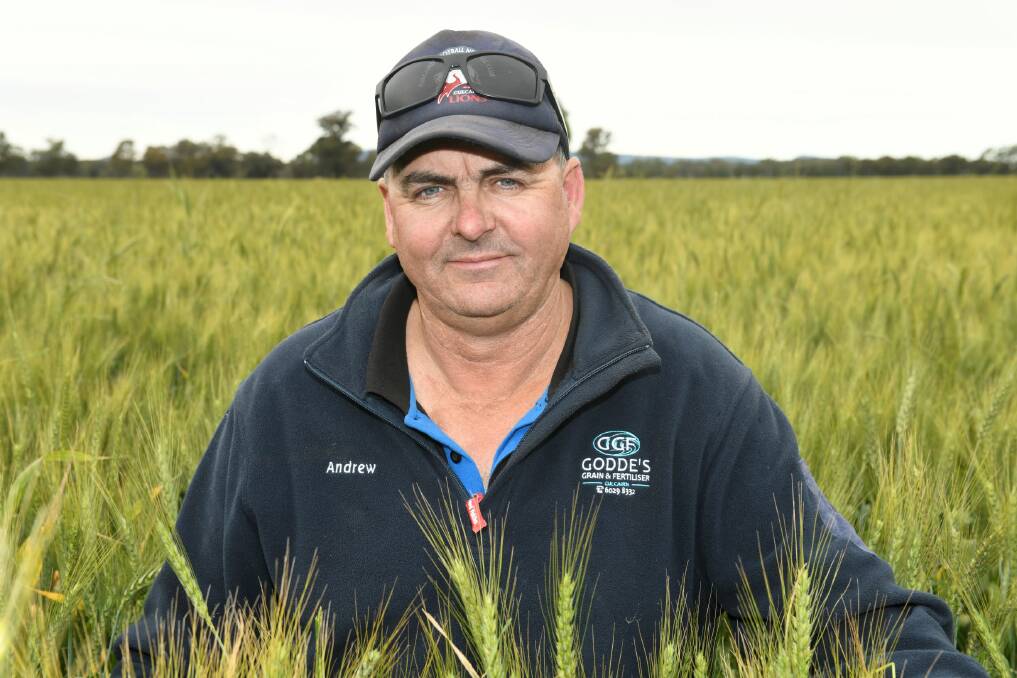Alternative pre-emergent an exciting option at Cowra

Branded content for FMC.
A new pre-emergent Group Q herbicide released for use on wheat, barley and canola has New South Wales agronomists and grain growers excited about the coming winter cropping season.
Elders agronomist Peter Watt, based at Cowra, in the state's central west, said Overwatch® Herbicide offered a valuable alternative to the chemistry that had been widely used to date on these mainstay crops.
"The cropping system in my area has been based on trifluralin," he said.
"We have had it for nearly as long as I've been in this game.
"But with the move to using more soluble products, our system has changed."
Mr Watt said most growers now used direct drilling - many into retained stubble - and needed other herbicide attributes to optimise results from modern cropping methods.
He said pre-emergent chemistries were vitally important due to high rates of herbicide resistance and increasingly variable seasonal conditions.
"If you get a wet year, your post-emergent pass is not guaranteed - or it could be delayed or compromised," he said.
"It is clear post-emergent herbicide options are not working, and we are relying on the pre-emergence package."
Overwatch® Herbicide, released by agricultural services company FMC for broadacre use in 2021, was first trialled by Elders Cowra in the dry season of 2018.
It controls susceptible weeds by disrupting photosynthesis, which turns plants pink and bleaches them before death.
"In canola and wheat trials, the effectiveness of Overwatch® Herbicide was very visual," Mr Watt said.
"What impressed us most is that we achieved high product efficacy on weeds, without compromising crop competition.
"It has great longevity, still paying-out a long time after some of the other products had given up the ghost."
Overwatch® Herbicide is registered for control of annual ryegrass, Bifora, hog weed/wireweed, lesser loosestrife, silvergrass and sow thistle.
It also provides suppression of barley grass, bedstraw, brome grass, capeweed, phalaris, prickly lettuce, wild oats and wild radish.
Mr Watt said annual ryegrass was endemic in his region, along with Group A and B herbicide resistance and - in some cases - multiple resistance.
He said there were also challenges with wild oats, barley grass, silvergrass, wild radish and others that could be targeted with Overwatch® Herbicide label.
"For annual ryegrass control, Overwatch® Herbicide is achieving an 80-90 per cent kill," he said.
"That is up there with some of the other market leaders.
"There is also flexibility in being able to use it on wheat, barley and canola.
"I think it will be particularly valuable as another option in barley and canola phases of the rotation."

Mr Watt said controlling broadleaf weeds in canola had been difficult in recent years, with the need to default to the triazines or increasingly unreliable Clearfield® chemistry.
"Overwatch® Herbicide is a great complement to Clearfield® technology, triazine tolerant options and for non-herbicide tolerant Canola.," he said.
Culcairn grower Andrew Godde said one of his biggest cropping challenges was keeping annual ryegrass at bay in a wide range of crops.
He said this weed was the Achilles heel on his south eastern Riverina property.
He uses pre-emergent chemistry to try to combat the annual ryegrass early in the season.
During 2020, he tried the new Overwatch® Herbicide from FMC in a side-by-side comparison in wheat.
The trial area was planted in the last week of April and the crops received 70 millimetres of rain in the days that followed.
"We compared the Overwatch® Herbicide with Treflan™ and Sakura®, which is of one of our mainstay herbicides," Mr Godde said.
"It seemed there were fewer weed numbers in the Overwatch® Herbicide treatments, compared to the other trial plots.
"And I continued to be impressed with it as the season unfolded.
"The plots with Overwatch® Herbicide treatments were cleaner and had less annual ryegrass.
"I particularly liked the way it turned the annual ryegrass plants pink, as I could see it working as I drove past the paddock.
"It gave me a bit of peace of mind that my money was working for me."
Mr Godde said the launch of Overwatch® Herbicide as a new pre-emergent option was welcomed and would make it much easier to rotate chemistries.
"The same products have been used too many times, and that's why we need to see this new technology coming through," he said.
"There is an old saying - if you are on a good thing, don't stick to it. Try and mix it up a bit."
Overwatch® Herbicide is registered for use on canola, wheat and barley and Mr Godde said it was likely to be used in their wheat phase in 2021.
"We usually use Sakura® and Treflan™ in the first year after a canola phase, and then treat with Avadex® and Treflan™ in the second year because we don't want to over-use the one product," he said.
"Overwatch® Herbicide will fit well in our program.
"We will be able to use it on the first wheat crop, and then maybe Sakura on the second - or vice versa.
"I'm looking forward to having that different technology there."
A typical rotation for the Godde's enterprise is a canola (Roundup Ready® or a TT), followed by two crops of wheat - or a wheat and barley and then back to canola.
"It's usually the second year when we can have a blow out in weed numbers," Mr Goode said.
"Then you are back to canola - and back to square one."
Branded content for FMC.


